北京课改版四年级英语上册全册知识点汇总
北京课改版英语四年级上册 Unit 2 知识清单

UNIT 2 MAY I SPEAK TO MIKE?一、核心词汇1.动词:speak 说话bring带来drink 喝2.名词:robot 机器人housework 家务劳动school学校cold感冒3.其他:Ms女士Mrs夫人;太太really真的,是吗(表示疑问、惊讶、恼怒等) there在那里bad严重的,厉害的二、了解词汇1.名词:party聚会;宴会home 家number数字phone电话water水football足球2.动词:call打电话stay 停留;保持show展示3.其他:some一些them(宾格)他/她/它们who谁can能;会tomorrow明天with与(某人)在一起三、核心句型1.— May I speak to Mike?This is Yangyang. 可以让迈克接电话吗?我是洋洋。
— Speaking. 请讲。
解读: 这是打电话给某人,接电话的正是要找的人的日常用语。
“May Ispeak to…?”意为“可以让……接电话吗?”,“This is….”表示“我是……”。
举一反三: — May I speak to Lily?This is Liangliang. 可以让莉莉接电话吗?我是亮亮。
— Speaking. 请讲。
— May I speak to Shasha?This is Tony. 可以让莎莎接电话吗?我是托尼。
— Speaking. 请讲。
2.I’m doing housework with my mum. 我正在和我妈妈一起做家务。
解读: 这是现在进行时的肯定句,表达某人正在做某事。
句型结构: 主语 + be动词 + 现在分词 + 其他.举一反三: Huanhuan is drinking water. 欢欢正在喝水。
They are playing basketball. 他们正在打篮球。
Lele and Sam are eating meat. 乐乐和萨姆正在吃肉。
北京课改四上Unit3知识清单
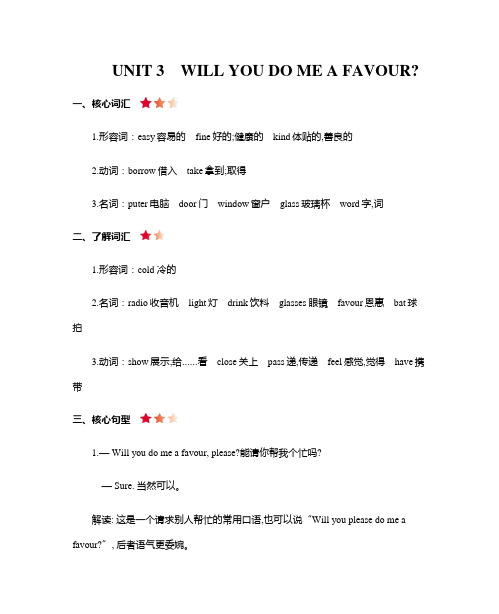
UNIT 3WILL YOU DO ME A FAVOUR?一、核心词汇1.形容词:easy容易的fine好的;健康的kind体贴的,善良的2.动词:borrow借入take拿到;取得3.名词:puter电脑door门window窗户glass玻璃杯word字,词二、了解词汇1.形容词:cold 冷的2.名词:radio收音机light灯drink饮料glasses 眼镜favour恩惠bat球拍3.动词:show展示;给……看close关上pass递,传递feel感觉,觉得have携带三、核心句型1.— Will you do me a favour, please?能请你帮我个忙吗?— Sure. 当然可以。
解读: 这是一个请求别人帮忙的常用口语,也可以说“Will you please do me a favour?”, 后者语气更委婉。
2.— Would you please hold these books for me?请你帮我拿着这些书好吗?— No problem.没问题。
解读: 这是用来请求帮助的句型,含有说话者一定的希望,期待对方愿意做某事的意味。
would you please 意为“请你……”,其后加动词原形。
句型结构: Would you please + 动词原形 + 其他?肯定回答: No problem./Sure./OK./Of course.否定回答: I’m sorry +其他.举一反三: — Would you please close the window? 请你关上窗户好吗?— No problem. 没问题。
3.— Would you mind opening the door for me?请给我打开门好吗?— Sure. No problem. 当然可以。
没问题。
解读: 这是礼貌地要求某人做某事的句型及其回答。
mind意为“介意;反对”,其后加动名词,一般用于疑问句和否定句。
四年级上北京版英语U5-U7知识点总结1

一、单词、短语1.颜色(colour):red红色blue蓝色yellow黄green绿色brown棕色black黑色white白色pink粉色purple紫色orange 橙色gray灰色2.鞋(shoes):sneakers运动鞋sandals凉鞋boots靴子slippers拖鞋3.服饰(clothes):jacket夹克衫trousers/ pants裤子shorts短裤coat外套overcoat大衣shirt衬衫T-shirt T恤skirt短裙dress连衣裙gloves手套uniform制服socks袜子cap帽子hat礼帽4.食物(food):meatball肉丸Peking Duck烤鸭chicken鸡肉fish鱼肉salad沙拉soup汤hamburger汉堡sandwich三明治chips薯条ice cream冰激凌pie 派pizza披萨cake蛋糕potato土豆cabbage卷心菜mushroom蘑菇5.饮品(drinks):water水milk牛奶tea茶soy milk豆浆juice 果汁6.数字(number):onetwothreefour fivesixseveneightnineteneleventwelvethirteenfourteenfifteensixteenseventeeneighteennineteentwenty20thirty30forty40fifty50sixty60seventy70eighty80ninety90one hundred100 7.自然(nature): snow雪,下雪rain雨,下雨wind风ice冰air空气8.天气(weather)snowy下雪的rainy多雨的windy刮风的cloudy多云的sunny阳光充足的fine晴朗的hot热的cold 冷的warm温暖的cool凉爽的9.地点(place)park school farm zoo forest lake grassland mountain10.季节(season)spring春天summer夏天autumn/fall秋天winter冬天动词短语:want to想要look nice看起来好look at看try .on试穿get cold 变冷take your order点餐become water变成水go to parks去公园take long walks去散步close to nature 亲近自然visit my uncle看望我的叔叔find out找到其他短语、短句:Excuse me打扰下here you are给您how much多少钱 a pair of一双how about怎么样Of course 当然for me 给我in summer在夏天In Sydney在悉尼on weekends在周末on a farm在农场in the forest在森林on the grassland在草原by the lake 在湖边in the mountains在山上on the internet 在网上二、句子:购物 1.Can I help you?/What can I do for you? 我能帮你吗?Yes. I want to get a pen. 是的。
单词表总结和单词记忆练习-四年级上学期-北京版(一年级起点)课改版

单词表总结和单词记忆练习学期:四年级上学期版本:北京版(一年级起点)01单词表按课文顺序学习UNIT ONE WHY ARE YOU SO HAPPY? Lesson 1again 又,再次book 书glad 髙兴的,快活的why 为什么UNIT ONE WHY ARE YOU SO HAPPY? Lesson 2sad 悲伤的;难过的surprised 感到惊讶的UNIT ONE WHY ARE YOU SO HAPPY? Lesson 3get well 康复look for 寻找upset 心烦的,苦恼的UNIT TWO MAY I SPEAK TO MIKE? Lesson 5housework 家务劳动Mrs 太太;夫人Ms 女士robot 机器人speak 说话UNIT TWO MAY I SPEAK TO MIKE? Lesson 6bring 带来really 真的,是吗(表示疑问、惊讶、恼school 学校there 在那里UNIT TWO MAY I SPEAK TO MIKE? Lesson 7bad 严重的,厉害的cold 感冒drink 喝UNIT THREE WILL YOU DO ME A FAVOUR? Lesson 9 computer 电脑easy 容易的light 电灯word 字,词UNIT THREE WILL YOU DO ME A FAVOUR? Lesson 10 door 门glass 玻璃杯kind 体贴的,善良的window 窗户UNIT THREE WILL YOU DO ME A FAVOUR? Lesson 11 fine 好的;健康的take 拿到;取得UNIT FIVE WHICH KIND WOULD YOU LIKE? Lesson 15 brown 棕色;棕色的get 获得kind 种类pen 钢笔think 想;认为UNIT FIVE WHICH KIND WOULD YOU LIKE? Lesson 16 how much 多少钱pair 一双(副,对)shoe 鞋子UNIT FIVE WHICH KIND WOULD YOU LIKE? Lesson 17 buy 买sell 出售,卖shop 商店UNIT SIX MAY I TAKE YOUR ORDER? Lesson 19 cook 厨师duck 鸭子eat 吃healthy 有益健康的sour 酸的UNIT SIX MAY I TAKE YOUR ORDER? Lesson 20pie 酥壳有馅的饼sorry 抱歉,对不起soup 汤;羹UNIT SIX MAY I TAKE YOUR ORDER? Lesson 21 change 找给的零钱chicken 鸡肉hamburger 汉堡包money 钱UNIT SEVEN WHAT IS NATURE? Lesson 23become 变成,成为clever 机灵的;聪明的ice 冰UNIT SEVEN WHAT IS NATURE? Lesson 24close 接近的farmer 农夫,农民interesting 完整信息公众号英语超人lake 湖walk 散步UNIT SEVEN WHAT IS NATURE? Lesson 25air 空气live 生活say 说;讲02单词抄写将单词抄写6遍学习again 又,再次why 为什么book 书glad 髙兴的,快活的sad 悲伤的;难过的surprised感到惊讶的upset心烦的,苦恼的robot机器人Mrs太太;夫人speak说话Ms女士housework 家务劳动really 真的,是吗(表示疑问、惊讶、恼怒等)bring 带来there 在那里school 学校bad 严重的,厉害的cold 感冒drink 喝light 电灯word 字,词easy 容易的computer 电脑kind 体贴的,善良的glass 玻璃杯door 门window 窗户fine 好的;健康的take 拿到;取得think 想;认为03中英文连线用直线或序号将单词的中英文相连练习again(1) 又,再次why(2) 为什么book(3) 书glad(4) 髙兴的,快活的sad(5) 悲伤的;难过的surprised(6) 感到惊讶的upset(7) 心烦的,苦恼的robot(8) 机器人Mrs(9) 太太;夫人speak(10) 说话Ms(11) 女士housework(12) 家务劳动really(13) 真的,是吗(表示疑问、惊讶、恼怒等)bring(14) 带来there(15) 在那里school(16) 学校bad(17) 严重的,厉害的cold(18) 感冒drink(19) 喝light(20) 电灯word(21) 字,词easy(22) 容易的computer(23) 电脑kind(24) 体贴的,善良的glass(25) 玻璃杯door(26) 门window(27) 窗户fine(28) 好的;健康的take(29) 拿到;取得think(30) 想;认为04字母顺序打乱选出正确字母顺序的单词练习aigna gnaai again又,再次wyh hyw why为什么okbo okbo book书ldag glad aldg髙兴的,快活的sad dsa asd悲伤的;难过的esrsidpur rssrdeupi surprised感到惊讶的uetps upset speut心烦的,苦恼的botor rootb robot机器人rsM Mrs sMr太太;夫人speak easpk eksap说话hwuooeskr worheusok housework家务劳动really arylle ryalel真的,是吗(表示疑问、惊讶、恼怒等)bring inbgr igbnr带来rethe ereht there在那里oscolh soholc school学校abd bad dba严重的,厉害的clod oldc cold感冒irknd drink indrk喝iglth hlitg light电灯word wdor dwro字,词easy asye seya容易的ptrmcuoe ucrtopme computer电脑kndi dnik kind体贴的,善良的glass asgsl salgs玻璃杯doro door odor门window ownwid owndwi窗户nief fine iefn好的;健康的take atke tkae拿到;取得nitkh think ihtnk想;认为05单词填空填写单词所缺的2个字母练习a i n又,再次y为什么b o书a d髙兴的,快活的d悲伤的;难过的s u r p r s e感到惊讶的s e t心烦的,苦恼的b o t机器人r太太;夫人s p e说话o u s e o r k家务劳动r a l y真的,是吗(表示疑问、惊讶、恼怒等)b n g带来t h e在那里s c h l学校d严重的,厉害的c l感冒i n k喝l g h电灯o d字,词e s容易的o m u t e r电脑n d体贴的,善良的g s s玻璃杯o r门w n o w窗户f n好的;健康的t a拿到;取得t n k想;认为06看中文写英文在空白处写出对应的英文单词练习又,再次为什么书髙兴的,快活的悲伤的;难过的感到惊讶的心烦的,苦恼的机器人太太;夫人 说话女士家务劳动真的,是吗(表示疑问、惊讶、恼怒等)带来在那里学校严重的,厉害的感冒喝电灯字,词 容易的电脑 体贴的,善良的玻璃杯 门窗户 好的;健康的拿到;取得 想;认为。
北京课改版四年级上单词总结

四年级第一学期单词1.again又,再一次: Nice to see you again.很高兴再次见到你。
2.we我们: we are going to plant trees.我们将去种树。
3.are是: we are back to school again.我们又回到学校。
4.glad高兴的: Glad to see you too.见到你也很高兴。
5.why为什么: Why are you so happy?你为什么这么高兴呢?6.look看起来: .It looks so cool.它看起来很酷。
7.sad伤心的: Why do you look so sad?为什么你看起来那么伤心?8.bad严重的: I have a bad cold.我得了重感冒。
9.which哪个: Which season do you like?你喜欢哪一个季节?10.where在哪里: Where are you from?你从哪里来?11.there在那里——There are four. 有四个有12.hope希望: I hope so,too.我也希望这样。
13.hold拿着——cold寒冷的14.great极好的,伟大的15.surprises吃惊的:I’m very happy and surprises我既高兴又吃惊。
16.went去:He went to my grandpa’s house.他去过我爷爷家。
17.lend借给:I will lend you mine.我将把我的借给你。
18.may可以——May五月19.speak说话:May I speak to him?我可以和他说话吗?20.call打电话: I want to call my mom.我想要给我妈妈打电话。
21.door门: open the door打开门ter稍后: Can you call back later?你可以稍后再打来电话吗?23.them他们: She will like them very much.她将非常喜欢它们。
北京版四年级上册知识梳理(完整资料).doc

此文档下载后即可编辑北京版小学英语四上知识梳理Unit 1 Why are you so happy?feeling(情绪):sad悲伤的, surprised感到惊讶的, angry生气的, tired劳累的, excited 兴奋的, upset苦恼的, worried担心的,glad高兴的, happy,again又,再次, why为什么, book书, look for 寻找, get well 康复, messy脏乱的,missing丢失,hope希望,square正方形,worry担心back at school回校, played too hard玩得太累, come back回来, go to the zoo去动物园, eat up fish吃光鱼, read books读书, get well康复1. Why are you (so) happy? 你为什么(这么)高兴?Because we are back at school. 因为我们都回到了学校。
2. Why do you look so sad? 为什么你看起来这么伤心?Because my dog is missing. 因为我的狗丢了。
3. Nice to see you all again.很高兴再次见到你。
4. So do I.我也是。
5. D on’t be sad/upset. 别伤心/心烦。
6. I hope so. 我希望如此。
7. It’s square in shape and blue in colour. 它是方形,蓝色的。
8. Let’s look for it together. 我们一起寻找吧。
9. Don’t worry. 别担心。
10. She will get well soon. 她将很快康复的。
注意:句子的表达及人称和动词搭配I am, you/we/they are, he/she/ it is.I/you/we do, he/she/it doesUnit 2 May I speak to Mike?话题:打电话speak说话, robot机器人, housework家务劳动, Ms女士, Mrs太太, there在那里, really真的, bring带来, school学校, bad严重的, cold感冒, drink喝have a look看一看, do housework做家务, hold on稍等, call back回电话, bad cold重感冒, go to school去上学, stay in bed卧床休息, drink a lot of water大量喝水, play football踢足球, come to my birthday party参加我的生日聚会,bring… to school带到学校来,call back回电话,1. May I speak to Mike? This is Yangyang. 我能找一下麦克吗?我是洋洋。
四年级上册英语单元知识梳理 北京课改版.doc

四年级上Unitl单元重点1.happy幸福的,高兴的6. excited兴奋的,激动的2angry生气的,愤怒的7. upset心烦的,苦恼的3sad悲伤的:难过的8. worried担心的4 surprised感到惊讶的5. tired疲倦的重点句型1.Why are you so happy ?你们为什么这么高兴?Because we are back at school.因为我们又回到了学校Why are you so angry ?你们为什么这么愤怒?Because the room is messy .因为房间太乱Why is he so tired ?他为什么这么疲倦?Because he played too hard .因为他玩得太多2Why do you look so sad ?你为什么这么难过?Because my dog is missing 因为狗丢了.Why do you look so surprised ?你们为什么这么惊讶?Because the gold is missing 因为金子丢了Why do they look so excited ?他们为什么这么激动?Because they will 1 go to the z 00?因为要去动物园。
3Why are you upset ?你为什么这么心烦?Because my new watch is missing 因为手表丢了四年级上Unit2单元重点重点单词或短语1. one 6.s ix 六2.two 二7. seven 七3.three 三 8. eight 八4.four 四9 . nine5.fve 五10 . .ten 十重点句型1.May I speak to Mike ?我找Mike.(我可以和Mike 说话吗?) This is Yangyang .我是洋洋If s Yangyang我是洋洋。
北京课改版英语四年级英语上册 Unit 7 知识清单

UNIT 7WHAT IS NATURE?一、核心词汇1.动词:become 变成,成为walk 散步say 说;讲live 生活2.名词:ice 冰farmer农夫,农民lake 湖air 空气3.形容词:hot 热的clever 机灵的;聪明的interesting 有趣的;有意思的close 接近的二、了解词汇1.动词:rain 下雨,降雨snow 下雪,降雪shine 照耀sound 听起来visit 访问,拜访need 需要,必须feel 感觉2.名词:winter 冬天rain雨snow雪park公园nature自然vacation 假期weekend 周末farm 农场forest 森林grassland 草原;牧场mountain 山3.介词:in在……里on在……上by在……旁边around在……周围4.其他:also 也because 因为so 所以;因此5.短语:in winter 在冬天on weekends 在周末go to parks去公园take long walks 长时间散步be close to 亲近……this winter vacation 今年寒假on a farm 在农场by the lake 在湖边in the mountain 在山里on the grassland 在……草原上find out 找出;查明on the Internet 通过因特网;在网络上三、核心句型1.Rain becomes snow in winter. 冬天雨变成雪.Ice can become water. 冰会变成水.解读: 此句是描述某物会变成某物的句型,其中 can是情态动词.举一反三: Rain becomes snow in winter, and snow can become rain in summer. 雨在冬天变成雪,雪在夏天会变成雨.2.— How’s the weather in Sydney?悉尼的天气如何?— Bad. It’s raining hard. 不好.正在下大雨.解读: 此句是how引导的一般现在时的特殊疑问句,用来询问某地天气情况如何.回答用“表示天气的形容词(Bad /Fine/Cold …)./It is + 现在分词.”.举一反三: — How’s the weather in Beijing?北京天气如何?— Cold. It is snowing. 冷.正在下雪.同义句: What’s the weather like in + 地点?3.— Where does he live?他住在哪里?— He lives on the farm. 他住在农场.解读: 此句是where引导的一般现在时的特殊疑问句,是询问他人住在哪里的句型.举一反三: — Where does Lily live?莉莉住在哪里?— She lives in Guangzhou. 她住在广州.4.We can’t live without water or air. 没有水和空气我们不能生存.解读: 这是一个陈述某人或某物没有某物不能生存的句型.举一反三: We can’t live without food. 没有食物我们不能生存.四、了解句型1.— What do you do on weekends?你周末做什么?— I often go to parks or take long walks. 我经常去公园或长时间散步.解读: 此句是what引导的一般现在时的特殊疑问句,用来询问他人某时做某事的句型.举一反三: — What do you do on weekends?你周末做什么?— I write stories on weekends. 我周末写故事.2.I’m going to visit my uncle this winter vacation. 今年寒假我要去看望我的叔叔.解读: 此句是一般将来时的肯定句,陈述某人将要做某事.be going to 表将来,后跟动词原形,还可使用will 替换 be going to.举一反三: He is going to visit his aunt on Sunday. 星期日他要去看望他的姑姑.3.Let’s find out on the Internet. 我们在网上查一查吧.解读: 此句是由let引导的祈使句,表达向对方提出建议.举一反三: Let’s go to the zoo this Sunday together. 我们星期日一起去动物园吧.4.We feel happy to be close to nature. 亲近大自然我们感到高兴.解读: 此句是陈述句,用来描述某人做某事的感觉.feel是系动词,其后接形容词.举一反三: He feels sorry to be late for school. 他为上学迟到感到很抱歉.。
北京课改版英语四年级英语上册Unit 5 知识清单
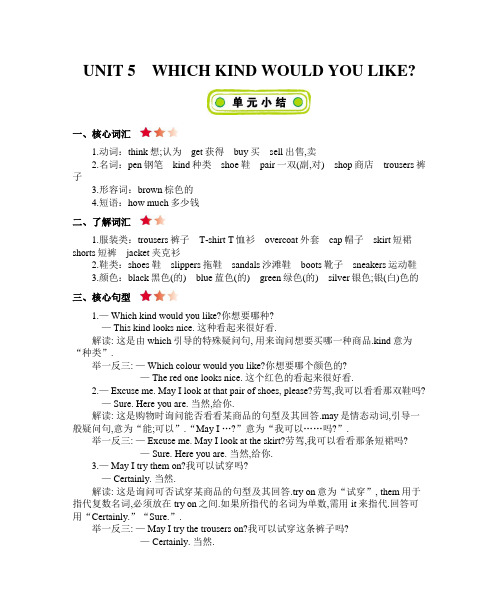
UNIT 5WHICH KIND WOULD YOU LIKE?一、核心词汇1.动词:think想;认为get获得buy买sell出售,卖2.名词:pen钢笔kind种类shoe鞋pair一双(副,对)shop商店trousers裤子3.形容词:brown棕色的4.短语:how much多少钱二、了解词汇1.服装类:trousers裤子T-shirt T恤衫overcoat外套cap帽子skirt短裙shorts短裤jacket夹克衫2.鞋类:shoes鞋slippers拖鞋sandals沙滩鞋boots靴子sneakers运动鞋3.颜色:black黑色(的)blue蓝色(的)green绿色(的)silver银色;银(白)色的三、核心句型1.— Which kind would you like?你想要哪种?— This kind looks nice. 这种看起来很好看.解读: 这是由which引导的特殊疑问句, 用来询问想要买哪一种商品.kind意为“种类”.举一反三: — Which colour would you like?你想要哪个颜色的?— The red one looks nice. 这个红色的看起来很好看.2.— Excuse me. May I look at that pair of shoes, please?劳驾,我可以看看那双鞋吗?— Sure. Here you are. 当然,给你.解读: 这是购物时询问能否看看某商品的句型及其回答.may是情态动词,引导一般疑问句,意为“能;可以”.“May I …?”意为“我可以……吗?”.举一反三: — Excuse me. May I look at the skirt?劳驾,我可以看看那条短裙吗?— Sure. Here you are. 当然,给你.3.— May I try them on?我可以试穿吗?— Certainly. 当然.解读: 这是询问可否试穿某商品的句型及其回答.try on意为“试穿”, them用于指代复数名词,必须放在try on之间.如果所指代的名词为单数,需用it来指代.回答可用“Certainly.”“Sure.”.举一反三: — May I try the trousers on?我可以试穿这条裤子吗?— Certainly. 当然.4.The red one will look nice on you. 你穿那件红色的会很好看.解读: 这是一个表达“某物穿在某人身上会很好看”的句型.举一反三: The blue trousers look nice on Maomao. 毛毛穿那条蓝裤子很好看.The red jacket will look nice on him. 他穿那件红色夹克衫会很好看.5.It will go with my trousers. 它和我的裤子很配.解读: 这是一个表达“某物和某物很匹配”的句型.go with意为“和……匹配”.举一反三: Blue trousers go with an orange jacket. 蓝色裤子和橘黄色夹克衫很配.The red T-shirt will go with my black shorts. 这件红色T恤衫和我的黑色短裤很配.四、了解句型1.I will take a brown one.我要买一支棕色的(钢笔).解读: 这是一个购物交际中表示“我要买……”的句型.举一反三: I will take the black sneakers. 我要买那双黑色运动鞋.2.I think so. 我也这么认为.解读: 这是表达“对某事和对方有相同观点”的句型.举一反三: — It’s getting hot. 天气变热了.— I think so. 我也这么认为.3.Sara’s mother takes Sara to a shop to buy a jacket. 萨拉的妈妈带萨拉去商店买夹克衫.解读: “take + sb + to + 某地”表示“带某人去某地”.to buy 是动词不定式,在这里表示目的.举一反三: My teacher takes us to the library to read books. 老师带我们去图书馆看书.4.— When is the birthday of that girl in the silver skirt?那个穿银白色短裙的女孩的生日是什么时候?— It’s in winter, on December the third. 在冬天,十二月三日.解读: 这是询问某人生日是什么时候的句型及其回答.句型结构: When is the birthday of sb?/When is sb s birthday?回答: It’s on + 具体日期./It’s in +月份/年份./It’s in + 季节.举一反三: — When is the birthday of your father?你爸爸的生日是什么时候?— It’s in spring, on March the first. 在春天,三月一日.。
北京课改版英语小学四年级上总复习

13.Please hold on,... ,it’s for you.
请稍等,...... ,是找你的。
9.get well
康复
go with...
与......搭配
10.do housework
做家务
take your order
点菜
11.have a look
看一看
in summer
在夏天的时候
12.hold on
稍等
close to nature
接近大自然
13.tell...to...
告诉...
shorts
短裤
6.excited
激动的
uniform
制服
7.miss
缺失的
Chinese cabbage
卷心菜
8.hope
希望
salty
盐多的
9.worried
担心的
soy milk
豆浆
10.watch
手表
mushroom
蘑菇
11.together
一起
pizza
披萨
12.ill
生病的
sandwich
机灵点,聪明的
23.easy
容易的
ice
冰
24.door
门
walk
散步
25.kind
体贴的,善良的
interesting
有趣的,有意思的
26.window
窗户
close
接近的
27.glass
玻璃杯
farmer
农夫,农民
28.borrow
借入
lake
湖Байду номын сангаас
北京版英语教材四年级上知识梳理
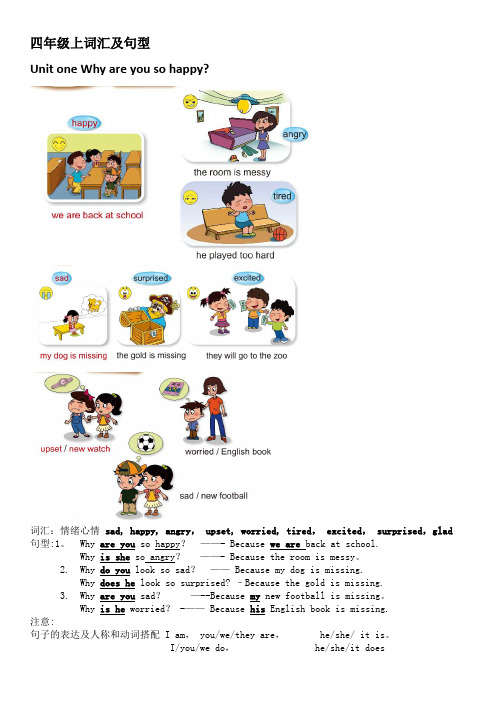
四年级上词汇及句型Unit one Why are you so happy?词汇:情绪心情 sad, happy, angry, upset, worried, tired, excited, surprised,glad 句型:1。
Why are you so happy?——- Because we are back at school.Why is she so angry?——- Because the room is messy。
2. Why do you look so sad?—— Because my dog is missing.Why does he look so surprised? –Because the gold is missing.3. Why are you sad?—--Because my new football is missing。
Why is he worried? -—— Because his English book is missing.注意:句子的表达及人称和动词搭配 I am, you/we/they are, he/she/ it is。
Unit two May I speak to Mike?话题:打电话短语表达: call打电话, call back回电话,speak, bring… to school带来telephone(cell phone手机,telegraph电报),My number is… bad cold重感冒 Stay in bed, drink a lot of waterWhat can I do for you?我能做些什么He is doing housework with his mother。
做家务I have…我有… I have some books。
He has a new robot.句型结构: 1. May I speak to Mike? This is Lingling.Speaking。
北京版小学英语教材四年级上册知识点总结

北京版小学英语教材四年级上册知识点总结(必做:所有内容一个单词中英文两遍,写在大英语本上;)(选做:四会单词默写,看中文写英文;三会单词及重点短语的英译中)四会单词:L1: again why books coolL2: sad great goldL3: new watch like together shapeL5: Ms Mrs speakL6: there story bring schoolL7:can bad tomorrow bed drink waterL9: much easyL10: door kind window cold turn openL11: ping-pong bat borrow take fine marker ruler pencil caseL15: get pen kind black brown think shapeL16: shoes try thirtyL17: buy trousers yellowL19: eat healthy potato now cook sweetL20: soup appleL21: twenty chicken change thirty today sixty-nineL23: snow hot rain clever water bad hard weatherL24: interesting close farmer lakeL25: live say kite wind三会单词:L1:glad because them happy angry tiredL2: missing surprisedL3: upset worried ill worryL5: robotL6: tell her really welcomeL9: please on play showL10: mindL11: favour scissors crayon sharpenerL15: help different colourL16: comfortable certainly takeL17: sell green redL19: sour saltyL20: salad fish hamburger chips dessertL21: moneyL23: because become degreeL24: sounds weekends liveL25: air trees without things plants grow重点短语:L1: be back at school the room is messy he played too hardL2: do n’t be sad come back go to the zooL3: don’t be upset blue in colour English book new footballL5: speak to doing housework hold on have a lookL6: call back the Monkey King the Harry Potter stories(首大名称)L7:bad cold go to schoolL9: hold these books no problem on the computer close the window turn off the light pass me the waterL10: a glass of hot water opening the door turning off the radio turning on the lightL11: Will you do me a favour? I don’t have my ping-pong bat with me. of courseL15: a nice colourL16: look at try on how much that pair of shoes that pair of slippers these sandals these boots those sneakersL17: a new jacket red one blue T-shirt black overcoat yellow cap school uniformL19: the sweet and sour fish take your order Chinese cabbage and potatoes some vegetables some meatballs Peking Duck a glass of soy milkL20: mushroom soup have ice cream(have some…/ an…) a pizza a glass of juice a sandwichL21: orange juiceL23: in summer in winter below zero in Sydney(首大名称)it’s raining it’s snowing the sun is shiningL24: go to park close to nature love nature visit my uncle this winter vacation on a farm in the forest on the grassland by the lakeL25: find out on the Internet (首大名称)。
北京版四年级上英语全册教材知识点整理
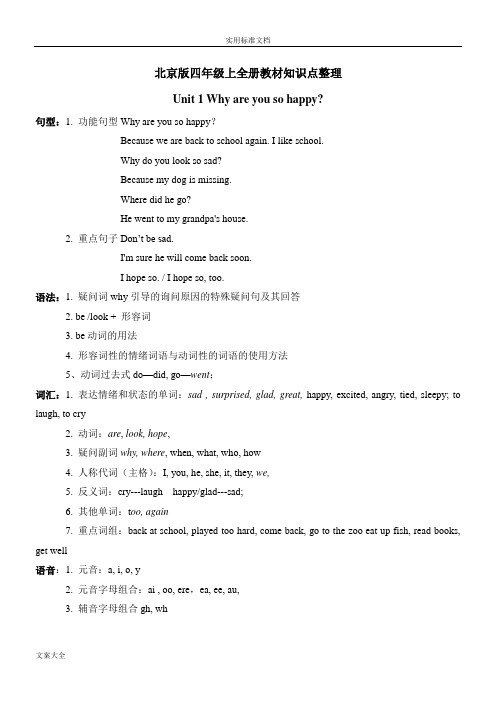
北京版四年级上全册教材知识点整理Unit 1 Why are you so happy?句型:1. 功能句型Why are you so happy?Because we are back to school again. I like school.Why do you look so sad?Because my dog is missing.Where did he go?He went to my grandpa's house.2. 重点句子Don’t be sad.I'm sure he will come back soon.I hope so. / I hope so, too.语法:1. 疑问词why引导的询问原因的特殊疑问句及其回答2. be /look + 形容词3. be动词的用法4. 形容词性的情绪词语与动词性的词语的使用方法5、动词过去式do—did, go—went;词汇:1. 表达情绪和状态的单词:sad , surprised, glad, great, happy, excited, angry, tied, sleepy; to laugh, to cry2. 动词:are, look, hope,3. 疑问副词why, where, when, what, who, how4. 人称代词(主格):I, you, he, she, it, they, we,5. 反义词:cry---laugh happy/glad---sad;6. 其他单词:t oo, again7. 重点词组:back at school, played too hard, come back, go to the zoo eat up fish, read books, get well语音:1. 元音:a, i, o, y2. 元音字母组合:ai , oo, ere,ea, ee, au,3. 辅音字母组合gh, whUnit 2 May I speak to Mike?句型: 1. 功能句型:May I speak to Yangyang?It's Maomao. Speaking.Is Guoguo there?Sorry, she is not home/here.Who's speaking? It's Lingling.2.重要句型:Can I do…? /I am sure… / I have a bad cold. I can’t go to school.语法: 1. speak to 和...说话,跟...说话;to 后面要用人称代词宾格形式。
北京版四年级上册英语单元知识点整理

北京版四年级上册英语单元知识点整理Unit 1 - Greetings- Learning how to greet people in English- Understanding the phrases "Hello, Hi, Good morning, Good afternoon, Good evening"- Practicing different ways to say goodbye in EnglishUnit 2 - Classroom Objects- Understanding the phrases "pen, pencil, book, bag, desk, chair, etc."- Practicing how to ask for and give objects in EnglishUnit 3 - Numbers- Learning how to count from 1 to 100 in English- Understanding the concepts of ordinal numbers (first, second, third, etc.)- Practicing how to ask and answer questions about numbers in EnglishUnit 4 - Colors- Learning the names of different colors in English- Understanding how to describe objects using colors in English- Practicing how to ask and answer questions about colors in EnglishUnit 5 - Classroom Language- Understanding how to ask and answer questions about classroom activities- Practicing how to use classroom language correctly in EnglishUnit 6 - Family- Learning the names of family members in English- Understanding how to describe family relationships in English- Practicing how to talk about family members using possessive pronouns in EnglishUnit 7 - Food and Drinks- Understanding how to ask for and order food in English- Practicing how to express likes and dislikes for different food and drinks in EnglishUnit 8 - Daily Routines- Learning how to talk about daily routines in English- Understanding the phrases "get up, have breakfast, go to school, do homework, etc."- Practicing how to ask and answer questions about daily routines in EnglishUnit 9 - Weather- Learning how to describe different types of weather in English- Understanding how to talk about the seasons in English- Practicing how to ask and answer questions about the weather in EnglishUnit 10 - Festivals- Learning about different festivals celebrated in English-speaking countries- Understanding the customs and traditions associated with these festivals- Practicing how to talk about festivals and celebrations in English以上为北京版四年级上册英语单元知识点整理,共涵盖了10个单元的学习内容。
小学英语四年级上册北京版基础知识总复习
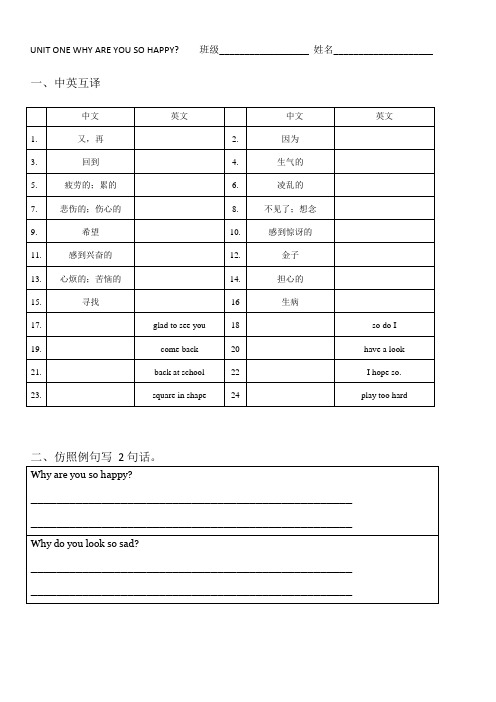
UNIT ONE WHY ARE YOU SO HAPPY? 班级__________________ 姓名____________________ 一、中英互译二、仿照例句写 2 句话。
三、根据课文内容,补全单词。
at school again. They like school. They are _____ to see each other. Guoguo is so happy, becauseis _____. Lingling _____ him not to be sad. Sheis _____. Yangyang _____ her to _____ _____ it, and tells her not to be _____. Yangyang looksUNIT TWO MAY I SPEAK TO MIKE? 班级__________________ 姓名____________________ 一、中英互译二、仿照例句写 2 句话。
三、根据课文内容,补全单词。
Shecannotgives Yangyang has a new ______. It’s a birthday gift________. He is now calling Mike, but Mike is _____. He is ______________ with his mum. He is a goodUNIT THREE WILL YOU DO ME A FAVOUR? 班级__________________ 姓名____________________ 一、中英互译二、仿照例句写 2 句话。
Maomao meets Sara in the street. He wants to get the key toto ______ these books for him. Sara is willing to ______. SheBaobao's grandma would like to play ____ _______ on theLingling is carrying things to the class, so she can't ______ the door. She asks Yangyang to help. He is very glad that heLingling's mom feels a little bit _____ when she sits on theMike and Baobao are going to have a ___________ match, but Baobao does not have his ping-pong _______ with him.goodUNIT FIVE WHICH KIND WOULD YOU LIKE? 班级__________________ 姓名____________________ 一、中英互译二、仿照例句写 2 句话。
英语四年级上册单元重点总结 北京版
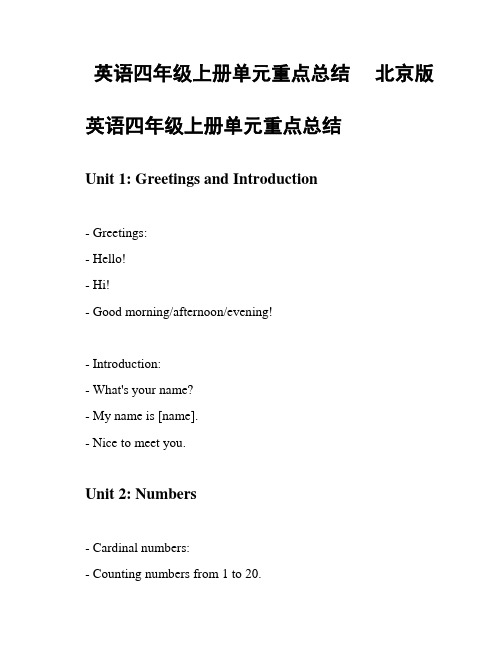
英语四年级上册单元重点总结北京版英语四年级上册单元重点总结Unit 1: Greetings and Introduction- Greetings:- Hello!- Hi!- Good morning/afternoon/evening!- Introduction:- What's your name?- My name is [name].- Nice to meet you.Unit 2: Numbers- Cardinal numbers:- Counting numbers from 1 to 20.- How old are you?- I am [number] years old.- Ordinal numbers:- First, second, third, etc.- What is your favorite color?- My favorite color is [ordinal number].Unit 3: Colors and Shapes- Colors:- Red, yellow, blue, green, orange, purple, pink, black, white. - What color is it?- Shapes:- Circle, square, triangle, rectangle, star.- What shape is it?Unit 4: Family- Vocabulary:- Family members: father, mother, brother, sister, grandfather, grandmother.- Who is he/she?- He/She is my [family member].Unit 5: Animals- Vocabulary:- Animals: dog, cat, rabbit, bird, fish, turtle, lion, tiger, elephant, giraffe.- What is your favorite animal?- My favorite animal is [animal name].Unit 6: Food and Drinks- Vocabulary:- Food: apple, banana, rice, noodles, bread, cake.- Drinks: water, milk, juice, tea, coffee.- What do you like to eat/drink?- I like to eat/drink [food/drink].Unit 7: Daily Routines- Verb phrases:- Brush my teeth, wash my face, eat breakfast, go to school, have lunch, do homework, go to bed.- What do you usually do in the morning/afternoon/evening?- I usually [verb phrase].Unit 8: Weather- Vocabulary:- Weather conditions: sunny, cloudy, rainy, windy.- How is the weather today?- Today is [weather condition].Unit 9: Clothes- Vocabulary:- Clothes: T-shirt, dress, pants, skirt, shoes.- What are you wearing today?- I am wearing [clothing items].Unit 10: My Home- Vocabulary:- Rooms in a house: living room, bedroom, kitchen, bathroom.- What is your favorite room in your home?- My favorite room is [room name].这份文档总结了英语四年级上册中各个单元的重点内容。
北师大版四年级(上册)英语知识点总结
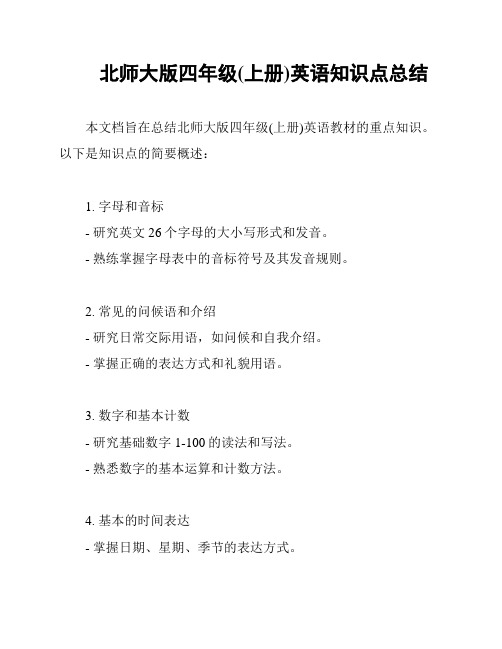
北师大版四年级(上册)英语知识点总结
本文档旨在总结北师大版四年级(上册)英语教材的重点知识。
以下是知识点的简要概述:
1. 字母和音标
- 研究英文26个字母的大小写形式和发音。
- 熟练掌握字母表中的音标符号及其发音规则。
2. 常见的问候语和介绍
- 研究日常交际用语,如问候和自我介绍。
- 掌握正确的表达方式和礼貌用语。
3. 数字和基本计数
- 研究基础数字1-100的读法和写法。
- 熟悉数字的基本运算和计数方法。
4. 基本的时间表达
- 掌握日期、星期、季节的表达方式。
- 研究日常时间的表达方式,如询问时间、描述一天的时间安排等。
5. 学校和教室用品
- 掌握学校和教室中常见物品的英文名称。
- 研究如何询问和描述这些物品。
6. 家庭成员和人物形容词
- 研究家庭成员的称呼,如父亲、母亲、兄弟姐妹等。
- 掌握描述人物外貌和性格的形容词。
7. 基本的食物和饮料
- 研究常见的食物和饮料的英文表达。
- 掌握如何提供和询问食物和饮料的服务。
8. 基本的地点和方位
- 研究常见地点和方位的英文表达,如家、学校、公园、上、下、左、右等。
- 熟悉如何问路和给出指示。
9. 基本的日常活动
- 研究描述日常活动的动词短语,如吃早饭、上学、看电视等。
- 熟练掌握这些动词短语的用法和时态。
以上是北师大版四年级(上册)英语教材的知识点总结。
希望本
文档对您有所帮助!。
北京课改版四年级英语上册全册知识点汇总
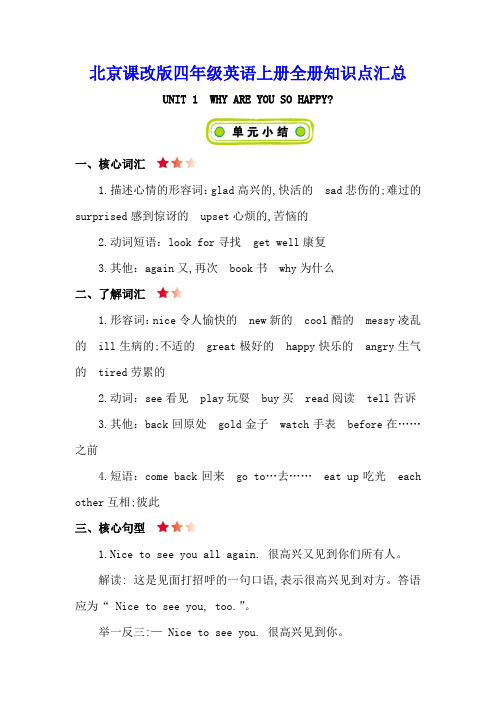
北京课改版四年级英语上册全册知识点汇总UNIT 1 WHY ARE YOU SO HAPPY?一、核心词汇1.描述心情的形容词:glad高兴的,快活的sad悲伤的;难过的surprised感到惊讶的upset心烦的,苦恼的2.动词短语:look for寻找get well康复3.其他:again又,再次book书why为什么二、了解词汇1.形容词:nice令人愉快的new新的cool酷的messy凌乱的ill生病的;不适的great极好的happy快乐的angry生气的tired劳累的2.动词:see看见play玩耍buy买read阅读tell告诉3.其他:back回原处gold金子watch手表before在……之前4.短语:come back回来go to…去……eat up吃光each other互相;彼此三、核心句型1.Nice to see you all again. 很高兴又见到你们所有人。
解读: 这是见面打招呼的一句口语,表示很高兴见到对方。
答语应为“ Nice to see you, too.”。
举一反三:— Nice to see you. 很高兴见到你。
— Nice to see you, too.很高兴见到你。
2.— Why are you so happy?你为什么这么高兴?— Because we are back at school. I like school. 因为我们回到学校了。
我喜欢学校。
解读: 这是询问原因及回答的句型。
句型结构: Why + be动词 + 主语 + 形容词?回答: Because + 原因.举一反三:— Why are you so tired?你为什么这么累?— Because I worked for 12 hours.因为我工作了12个小时。
— Why are you so sad?你为什么这么难过?— Because my dog is missing.因为我的狗丢了。
北京版四年级上册英语单元知识总结
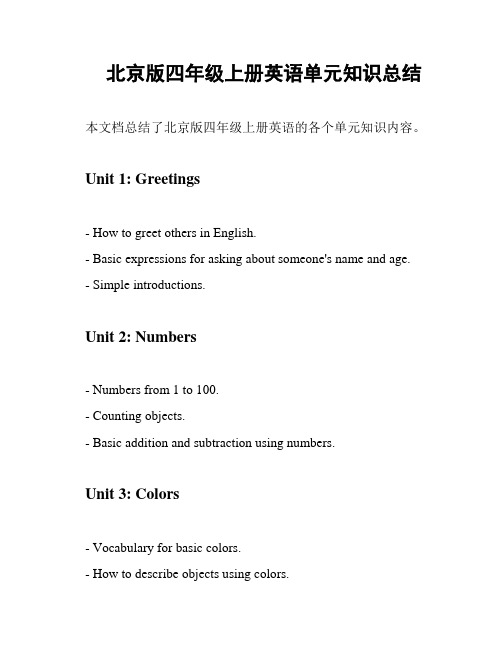
北京版四年级上册英语单元知识总结本文档总结了北京版四年级上册英语的各个单元知识内容。
Unit 1: Greetings- How to greet others in English.- Basic expressions for asking about someone's name and age. - Simple introductions.Unit 2: Numbers- Numbers from 1 to 100.- Counting objects.- Basic addition and subtraction using numbers.Unit 3: Colors- Vocabulary for basic colors.- How to describe objects using colors.- Simple color matching exercises.Unit 4: Family- Vocabulary for family members.- Talking about family relationships.- Describing family members using adjectives.Unit 5: Body Parts- Identifying body parts in English.- Simple actions and gestures related to body parts. Unit 6: Animals- Describing animals using simple adjectives.- Basic understanding of animal habitats and behaviors. Unit 7: Food and Drinks- Expressing food preferences.- Simple dialogues related to ordering food.Unit 8: Daily Activities- Vocabulary for daily activities.- Expressing daily routines.- Talking about time using basic phrases.Unit 9: Weather- Describing weather conditions.- Basic understanding of weather-related language. Unit 10: My School- Vocabulary related to school subjects and facilities. - Describing school activities.- Basic understanding of school routines.以上是北京版四年级上册英语单元知识的总结,希望能对学生们复和巩固所学有所帮助。
- 1、下载文档前请自行甄别文档内容的完整性,平台不提供额外的编辑、内容补充、找答案等附加服务。
- 2、"仅部分预览"的文档,不可在线预览部分如存在完整性等问题,可反馈申请退款(可完整预览的文档不适用该条件!)。
- 3、如文档侵犯您的权益,请联系客服反馈,我们会尽快为您处理(人工客服工作时间:9:00-18:30)。
北京课改版四年级英语上册全册知识点汇总UNIT 1 WHY ARE YOU SO HAPPY?一、核心词汇1.描述心情的形容词:glad高兴的,快活的sad悲伤的;难过的surprised感到惊讶的upset心烦的,苦恼的2.动词短语:look for寻找get well康复3.其他:again又,再次book书why为什么二、了解词汇1.形容词:nice令人愉快的new新的cool酷的messy凌乱的ill生病的;不适的great极好的happy快乐的angry生气的tired劳累的2.动词:see看见play玩耍buy买read阅读tell告诉3.其他:back回原处gold金子watch手表before在……之前4.短语:come back回来go to…去……eat up吃光each other互相;彼此三、核心句型1.Nice to see you all again. 很高兴又见到你们所有人。
解读: 这是见面打招呼的一句口语,表示很高兴见到对方。
答语应为“ Nice to see you, too.”。
举一反三:— Nice to see you. 很高兴见到你。
— Nice to see you, too.很高兴见到你。
2.— Why are you so happy?你为什么这么高兴?— Because we are back at school. I like school. 因为我们回到学校了。
我喜欢学校。
解读: 这是询问原因及回答的句型。
句型结构: Why + be动词 + 主语 + 形容词?回答: Because + 原因.举一反三:— Why are you so tired?你为什么这么累?— Because I worked for 12 hours.因为我工作了12个小时。
— Why are you so sad?你为什么这么难过?— Because my dog is missing.因为我的狗丢了。
3.So do I. 我也是。
解读: 这是so引导的倒装句,表示前句叙述的情况也同样适合后句的人或物,意为“……也是”。
句型结构: So + be动词/助动词/情态动词 + 主语.举一反三: — I like English. 我喜欢英语。
— So do I. 我也喜欢。
— I eat an apple for dinner.我晚餐吃一个苹果。
— So does Jack. 杰克也是。
4.He will come back soon.它很快就会回来的。
解读: 这是一般将来时的肯定句,表示将要去做某事。
will后的动词要用原形。
句型结构:主语 + will + 动词原形 + 其他.举一反三: We will go to the park tomorrow. 明天我们要去公园。
The panda will be back to China next week. 那只熊猫将在下星期回到中国。
5.Don’t be upset. 别苦恼。
解读: 这是一个否定祈使句,用来表达劝告、叮嘱、请求或命令。
句型结构: Don’t + 动词原形 + 其他.举一反三: Don’t be late. 别迟到。
Don’t go out. 别出去。
6.— What’s it like?它什么样儿?— It’s square in shape and blue in colour. 它是方形的,蓝色的。
解读: 这是what引导的特殊疑问句,用来询问人或事物的外表特征。
句型结构: What + be动词 + 主语 + like?回答: 主语 + be动词 + 其他.举一反三: — What’s your brother like?你哥哥什么样儿?— He is tall and strong. 他又高又壮。
四、了解句型1.I like school. 我喜欢学校。
解读: like 是动词,主语是第三人称单数时, like也要变为第三人称单数形式likes。
举一反三: Sara likes the new watch. 萨拉喜欢这块新手表。
2.They are cool. 它们很酷。
The room is messy. 房间很乱。
解读: 这是描述人或事物特征的句型。
be动词要随主语的变化而变化。
句型结构:主语 + be动词 + 形容词.举一反三: The books are new.这些书是新的。
We are 13.我们十三岁了。
3.I hope so. 希望如此。
举一反三: I think so. 我认为如此。
I don’t think so. 我认为不是这样。
I guess so. 我猜如此。
4.Zoey’s father buys her a pet dog.佐伊的爸爸给她买了一只宠物狗。
解读: 这是表达给某人买某物的句型。
buy sb sth 相当于 buy sth for sb。
举一反三: I buy my son a watch.我给我儿子买了一块手表。
He buys his mother a flower.他给他妈妈买了一枝花。
5.Let’s look for it together.让我们一起找找吧。
解读: 这是let引导的祈使句,用于向对方提出邀请或建议。
let 后接不带to的动词不定式,构成短语let sb do sth,意思是“让某人做某事”。
句型结构: Let’s + 动词原形 + 其他.举一反三: Let’s go home together. 让我们一起回家吧。
Let’s be friends. 让我们做朋友吧。
6.Maomao looks sad. 毛毛看起来很难过。
解读: look 在此作系动词,意为“看上去;看起来”。
举一反三: He looks happy. 他看起来很高兴。
【拓展】常见的系动词还有: smell闻起来feel摸起来taste尝起来sound听起来UNIT 2 MAY I SPEAK TO MIKE?一、核心词汇1.动词:speak 说话bring带来drink 喝2.名词:robot 机器人housework 家务劳动school学校cold感冒3.其他:Ms女士Mrs夫人;太太really真的,是吗(表示疑问、惊讶、恼怒等) there在那里bad严重的,厉害的二、了解词汇1.名词:party聚会;宴会home 家number数字phone电话water水football足球2.动词:call打电话stay 停留;保持show展示3.其他:some一些them(宾格)他/她/它们who谁can能;会tomorrow明天with与(某人)在一起三、核心句型1.— May I speak to Mike?This is Yangyang. 可以让迈克接电话吗?我是洋洋。
— Speaking. 请讲。
解读: 这是打电话给某人,接电话的正是要找的人的日常用语。
“May Ispeak to…?”意为“可以让……接电话吗?”,“This is….”表示“我是……”。
举一反三: — May I speak to Lily?This is Liangliang. 可以让莉莉接电话吗?我是亮亮。
— Speaking. 请讲。
— May I speak to Shasha?This is Tony. 可以让莎莎接电话吗?我是托尼。
— Speaking. 请讲。
2.I’m doing housework with my mum. 我正在和我妈妈一起做家务。
解读: 这是现在进行时的肯定句,表达某人正在做某事。
句型结构: 主语 + be动词 + 现在分词 + 其他.举一反三: Huanhuan is drinking water. 欢欢正在喝水。
They are playing basketball. 他们正在打篮球。
Lele and Sam are eating meat. 乐乐和萨姆正在吃肉。
3.— Is Guoguo there? This is Sara.果果在吗?我是萨拉。
— Sorry, Sara. She’s not home. 对不起,萨拉。
她不在家。
解读: 这是打电话时询问及回答某人是否在的常用语。
举一反三: — Is Tom there? 汤姆在吗?— Sorry, he is not home. 对不起,他不在家。
— Is Tina there?蒂娜在吗?— Sorry, she is not here. 对不起,她不在这儿。
4.— Who’s calling, please? 请问谁在打电话?— This is Lingling. 我是玲玲。
解读: 这是询问及回答是谁在打电话的日常用语。
举一反三: — Who’s calling, please?请问谁在打电话?— This is Maomao. 我是毛毛。
5.— Will you bring them to school tomorrow?你明天会把它们带到学校吗?— Yes, I will. 是的,我会的。
解读: 这是will引导的一般将来时的一般疑问句及其回答。
will not = won’t。
句型结构: Will + 主语 + 动词原形 + 其他?回答: Yes, 主语 + will. /No, 主语 + will not/won’t.— Will you come to my birthday party?你会来我的生日聚会吗?— Yes, I will. 是,我会的。
— Will you go to the zoo on Sunday?你星期日会去动物园吗?— No, I won’t. 不,我不会去。
四、了解句型1.Do you want to have a look?你想看一看吗?解读: 这是询问对方是否想去做某事的句型。
want to do sth “想要去做某事”。
举一反三: Do you want to run with me?你想和我一起跑步吗?2.— What’s your phone number?你的电话号码是多少?— It’s….是……解读: 这是询问及回答电话号码的句型。
举一反三: — What’s your phone number? 你的电话号码是多少?—It’s 87690345. /87690345.是87690345。
/87690345。
3.I can’t go to school tomorrow. 明天我不能去上学了。
解读: can’t = can not, 是情态动词can的否定形式,意为“不能;不会”,后面跟动词原形。
举一反三: I can’t sing in English. 我不会用英文唱歌。
